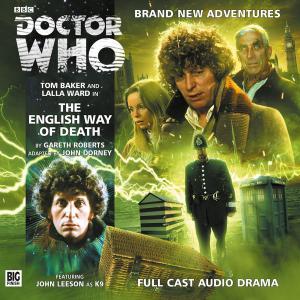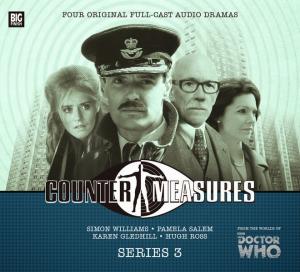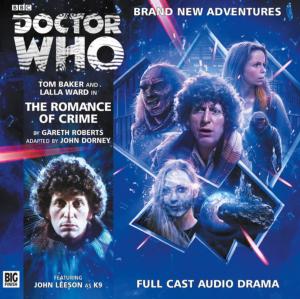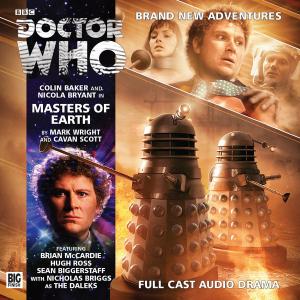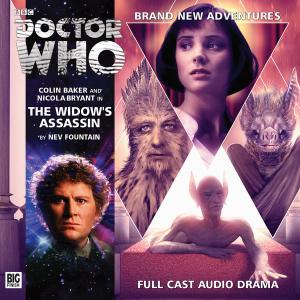
Written by Justin Richards
Directed by Ken Bentley
Big Finish Productions, December 2014
Peri (confused): A Time Lord! But that means ... No, you can’t be!
The Rani (satisfied): So you do know me, after all! I knew you would. Spit it out, girl! I can see it’s on the tip of your tongue!
Peri (in horrified realisation): The Rani!
Peri and the Rani, The Rani Elite
It is a little ironic that the release of The Rani Elite occurred only a month after the broadcast of Dark Water/Death in Heaven, the two-part finale in Doctor Who’s most recent TV series. The revelation that Missy was a female incarnation of the Master invited vast debate in online forums by fans, with some decrying the Master’s gender swap and others praising it. Those who opposed it in particular bemoaned that it would have been more “logical” if Missy had been another former Time Lady nemesis the Rani, particularly as the uploading of dying minds into the Nethersphere was apparently more in tune with the Rani’s modus operandi.
Realistically, there was never any chance that Missy would have been the Rani. This is because the Master is the most well known foe after the Daleks and the Cybermen to audiences of the modern series. If Missy had been the Rani, the modern audience’s reaction would have been “Who?” or “Huh”? As much as long-term fans may dislike this answer, it’s really as simple as that. The Rani featured in two stories in the latter years of the classic TV series – not least in an era when the show was in decline and maligned by the BBC, the audience and some fans alike. She certainly didn’t leave such a lasting impression that she deserved to be Missy. (Yes, the Rani has been in plenty of other Doctor Who spin-off fiction over the years and even the 30th anniversary short Dimensions in Time but again that’s not enough of a CV to impress a modern viewing audience!) There are plenty of other Time Ladies, notably Romana and Susan, who could have also been just as entitled to be Missy if the Doctor Who production team hadn’t been bold enough to make her the Master’s latest incarnation.
Fans of the Rani will simply have to settle for The Rani Elite as a consolation prize. The one thing in this story’s favour is that Big Finish has finally revived the character for audio; indeed, after 15 years of holding the Doctor Who licence, it’s surprising Big Finish never brought the Rani back sooner. Siobhan Redmond, best known for television work such as The Bill, Between the Lines and Holby City, has succeeded the late Kate O’Mara in the part (she is only the second actor to play the Rani, albeit the third Scot to play a Time Lord/Lady in the last year, after Peter Capaldi’s Twelfth Doctor and Michelle Gomez’s Mistress). It is also fitting that to herald the renegade Time Lady’s return to the Doctor Who universe, she is pitted against the original TARDIS team that she fought in 1985’s The Mark of the Rani: the Sixth Doctor (Colin Baker) and Peri Brown (Nicola Bryant).
In The Rani Elite, the Doctor and Peri answer an invitation to the CAGE – the College of Advanced Galactic Education – where the Doctor is to receive an honorary degree in moral philosophy that even he’s not certain about but he anticipates is “well deserved!” Deliberately arriving a day before the ceremony, it isn’t long before they discover that someone is conducting unethical medical experiments on some of the CAGE’s brightest students, in the process substantially altering their personalities. It soon becomes clear that the galaxy’s foremost authority in moral philosophy Professor Baxton isn’t whom she seems and her plans for the Doctor are not as benevolent as an honorary degree.
While the premise I’ve described is actually quite intriguing, it is dependent on the listener knowing as little as possible about the story for it to be effective. Unfortunately, it is all too predictable from the start because we know from the title that the story features the Rani; further, there was much publicity about the character’s revival and Redmond’s casting from Big Finish five months before the serial’s release. As a result, any opportunity for genuine surprise or twists is lost. Imagine how more effective the story would have been if it had a less revealing title and Redmond’s casting had been kept secret (she could have been credited simply as Professor Baxton on the CD sleeve) until the episode one cliffhanger. This would have been genuinely surprising for listeners and made the story far more engaging. The problem with knowing about the Rani in advance is that you’re then second-guessing exactly what her latest scheme is (and in this reviewer’s case, it didn’t take a lot of guesswork at all).
By comparison, Big Finish should have taken a leaf out of the book for one of its earliest Doctor Who releases over a decade back. The 2001 serial Dust Breeding marked the return of Geoffrey Beevers as the Master with little prior fanfare, making it a genuine, astonishing twist for long-term fans upon the first listening. To this day, it still remains one of Big Finish’s masterstrokes and brilliant cliffhangers. The only announcement at the time of that release which seemed significant was that Beevers was a guest in the story with his late wife Caroline John, presumably as a new character. To have revealed that Beevers would have been playing the Master would have ruined the tale – and the experience of not knowing who the villain was.
As a result, by revealing its trump card so early, The Rani Elite also lacks a major twist to the plot. In the two previous releases – The Widow’s Assassin and Masters of Earth – there were at least some unpredictable turning points to the tales that kept them ticking along and maintained the listener’s flagging interest. The Rani Elite is largely run of the mill from the moment the Rani reveals herself at the episode one cliffhanger, as the major characters get caught, escape, get recaptured and escape again.
U
Rather ironically for those fans that would have preferred Michelle Gomez had played the Rani on television, the Rani’s agenda (spoilers!) is eerily similar to Missy’s and certainly consistent with her grand plan in 1987’s Time and the Rani. It doesn’t matter that the Sixth Doctor is effectively encountering the regenerated Rani out of chronological order (for the Rani, these events occur post-Time and the Rani) because while we know the Doctor himself isn’t specifically threatened, Peri’s fate, occurring as it does after her muddled departure on television, is now much more open-ended. Indeed, for a while, you are left seriously wondering if Peri is still destined for a tragic end. After all, in this loose trilogy of Sixth Doctor adventures, Peri has been subjected to no small amount of repression by unconnected malevolent forces. In The Widow’s Assassin, we learnt she spent five years under the thrall of a mind parasite whilst Queen of the Krontep, and in Masters of Earth, upon her first trip back in the TARDIS, she was infected by a Varga plant and started to undergo a physical transformation into a Varga herself. In The Rani Elite, Peri finds herself again subjected to mind manipulation, a prospect that naturally terrifies her after the events of 1986’s The Trial of a Time Lord, and Nicola Bryant convincingly portrays that terror.
Once again, Big Finish’s sound effects and a strong cast help to paper over some of the cracks in Justin Richards’ script. Siobhan Redmond does Kate O’Mara’s memory justice in her portrayal of the Rani, faithfully continuing O’Mara’s original rendition of a highly intelligent, ruthless, amoral and calculating scientist with a superiority complex. In fact, were it not for the Scots lilt in Redmond’s voice, her portrayal would be almost indistinguishable from O’Mara’s performance.
Redmond’s interpretation is also a vastly different one to that of Gomez’s Missy – the Rani has none of the Master/Mistress’ megalomania and vindictiveness, she is simply cunning and matter-of-fact. She is a scientist that is dedicated to seeing the results of her experiments through to the end, whether by fair or foul means. She doesn’t necessarily enjoy killing or inflicting pain but she’s not squeamish about either, as she clearly demonstrates over the course of the story.
Colin Baker’s Doctor, of course, is the perfect sparring partner for Redmond’s Rani, someone that is at least her equal on an intellectual level (the Rani, of course, considers herself the Doctor’s superior, resorting to the insult of “Double Gamma” to make her point!). Baker, as ever, delivers a commanding performance but, as in Masters of Earth, injects plenty of humour into the dialogue too, eg:
The Doctor (to the Rani): And it’s a good job I did turn up early!
Peri: In time to thwart your plans!
The Rani: Thwart my plans? You must be a devotee of the cheapest forms of melodrama!
The Doctor: Forgive her, she’s American!
The younger members of the cast also deliver strong performances throughout the story. Becky Wright delivers a fearful, sympathetic turn in the first episode as Lizzo, one of the students at the heart of the Rani’s unethical medical experiments, while Charlie Morton (Reev) provides a slimy underling for the Rani and Mike Noble (Miklev) able back-up/moral support for the Doctor and Peri.
Ultimately, The Rani Elite, while full of promise, is a “by the numbers” Doctor Who tale. It is not only a weak serial in its own right but also the weakest link in a trilogy of Sixth Doctor stories in the last three months that have all been of mixed quality. All the serials have had some good ideas to recommend them but the stories have often been found wanting. This is a pity, as Colin Baker and Nicola Bryant have been fantastic in all of them but there hasn’t been enough character development between the Doctor and Peri that reflects their rekindled friendship after the traumatic events of The Trial of a Time Lord. The return of the Rani also under-delivers in its promise but there is certainly potential for the character to be reused and for Siobhan Redmond to stamp her authority on the part. Another round between the Rani and the Doctor and Peri, as well as encounters with other Doctors, ought not to be out of the question but Big Finish needs to conceive stories that will make the villain’s future appearances memorable and exciting for the listeners. In other words, more focus on the scripts, and less attention to the publicity.
